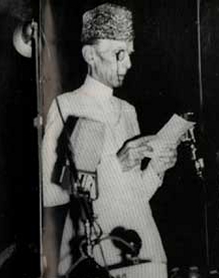
Back মুহাম্মদ আলী জিন্নাহর ১১ আগস্টের ভাষণ Bengali/Bangla Pidato ke-11 Muhammad Ali Jinnah ID محمد علی جناح کی گیارہ اگست کی تقریر Urdu Diễn văn ngày 11 tháng 8 của Muhammad Ali Jinnah Vietnamese

Muhammad Ali Jinnah's 11 August Speech is a speech made by Muhammad Ali Jinnah, founding father of Pakistan and known as Quaid-e-Azam (Great Leader) to the Constituent Assembly of Pakistan. While Pakistan was created as a result of what could be described as Indian Muslim nationalism,[1] Jinnah was once an ambassador of Hindu-Muslim unity.[2][3][4] When the Partition of India finally occurred, Jinnah, soon-to-be Governor-General of the Dominion of Pakistan, outlined his vision of Pakistan in an address to the Constituent Assembly, delivered on 11 August 1947. He spoke of an inclusive and impartial government, religious freedom, rule of law ,and equality for all.[5][6]
He opened by saying the Assembly had two tasks: Writing a provisional constitution and governing the country meantime. He continued with a list of urgent problems:
- Law and order, so life, property, and religious beliefs are protected for all.
- Bribery
- Black-marketing
- Nepotism
Next, he discussed at length the partition, saying many were dissatisfied with the details but a united India would never have worked. He urged forgiveness of bygone quarrels among Pakistanis, so all can be "[...] first, second and last a citizen of this State with equal rights [...]". Pointing out that England in past centuries had settled its fierce sectarian persecutions, he proposed that "in course of time Hindus would cease to be Hindus and Muslims would cease to be Muslims, not in the religious sense, because that is the personal faith of each individual, but in the political sense as citizens of the State."
He concluded by quoting a friendly, official message from the United States.
- ^ Ian Bryant Wells, Ambassador of Hindu Muslim Unity
- ^ Official website, Government of Pakistan. "The Statesman: Jinnah's differences with the Congress". Archived from the original on 27 January 2006. Retrieved 20 April 2006.]
- ^ Stanley Wolpert "Jinnah of Pakistan" Oxford University Press
- ^ Ajeet Javed "Secular and Nationalist Jinnah" Jawaharlal Nehru University Press
- ^ In his actual speech of 11 August 1947, Muhammad Ali Jinnah said "You are free. Free to go to your temples, mosques, churches or any other places of worship in this State of Pakistan. You may belong to any religion, caste or creed, that has nothing to do with the business of the state. Thank God, we are not starting in those days. We are starting in the days where there is no discrimination, no distinction between one community and another, no discrimination between one caste or creed and another. We are starting with this fundamental principle: that we are all citizens, and equal citizens, of one State. What exists now is that every man is a citizen, an equal citizen and they are all members of the Nation. Now I think we should keep that in front of us as our ideal, and you will find that in course of time hindus would cease to be hindus, and muslims would cease to be muslims, not in the religious sense, because that is the personal faith of each individual, but in the political sense as equal citizens of the State. In any case, Pakistan will never be a theocracy to be ruled by clergy, with a divine mission". In the same speech he said "We are starting in the days where there is no discrimination, no distinction between one community and another, no discrimination between one caste or creed and another. We are starting with this fundamental principle: that we are all citizens, and equal citizens, of one State." Mr. Jinnah's presidential address to the Constituent Assembly of Pakistan – 11 August 1947
- ^ Syed Qasim Mehmood "Message of Quaid-e-Azam"
© MMXXIII Rich X Search. We shall prevail. All rights reserved. Rich X Search